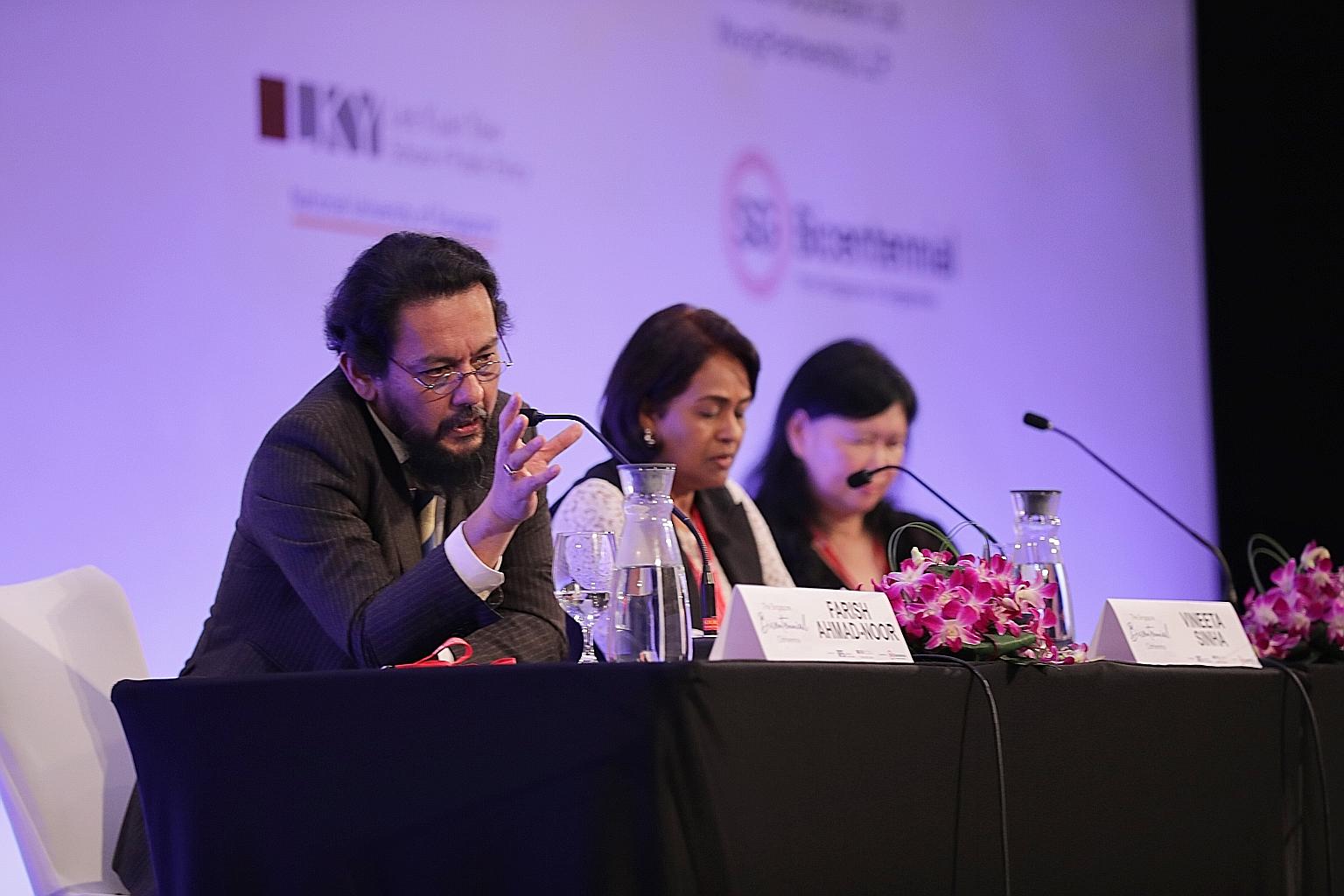S-E Asia must remain diverse and multicultural, say academics
Sign up now: Get ST's newsletters delivered to your inbox

Associate Professor Farish Ahmad-Noor of the S. Rajaratnam School of International Studies speaking at the Singapore Bicentennial Conference yesterday. With him were National University of Singapore (NUS) head of sociology Vineeta Sinha (centre), who was moderator of the panel discussion on diversity and identity, and fellow panellist Brenda Yeoh of NUS.
ST PHOTO: GIN TAY
Tee Zhuo
Follow topic:
A future in which the South-east Asian region is split in two, between rich elites and millions of the poor, is the biggest fear of academic Farish Ahmad-Noor.
The frightening picture he paints is of a small cluster of cosmopolitan "cafe latte-drinking, sushi-eating" elites "swimming on a sea of 600 million poor South-east Asians" who have no access to mobility.
Associate Professor Farish of the S. Rajaratnam School of International Studies made the point during a panel discussion on diversity and identity on the final day of the Singapore Bicentennial Conference.
Fellow panellist Brenda Yeoh, of the National University of Singapore, said families in the region are now more diverse, with many Singaporeans marrying people from nearby countries.
"We talk about South-east Asia as though it's out there. Aren't we in South-east Asia, and isn't South-east Asia here, in us, with us?"
Agreeing, Prof Farish said he is a Malaysian married to a Singaporean of Indonesian origin. But he warned against seeing cross-border marriages as a panacea and reminded everyone that such marriages are not just between elites.
"We do not celebrate these marriages when they are among the working classes," he said. "That is the kind of slippage, the silencing that we need to be cautious about."
Prof Farish said in his presentation that multiculturalism in the region was far richer before colonialism, and pointed to the need to adopt a regional, Asean identity and embrace its complexity.
Professor Yeoh traced a history of diversity in Singapore, even as she noted possible reflections of colonial attitudes in how Singapore treats migrant workers.
The issues animated the audience, who raised points ranging from "new colonialism" in the treatment of marginalised groups to tensions between a regional identity and a national one.
The founder of the Brahm Centre charity, Ms Angie Chew, pinpointed Singapore's "new colonial" attitude towards foreign maids and LGBTQ, or lesbian, gay, bisexual, transgender and queer people.
She said: "If we are going to be inclusive... it is time we accepted these people as they are, without making them feel they are not good enough for our society."
Prof Yeoh, who in her presentation spoke of the "pride and prejudice" mentality of the colonialists that left little room for mixing, asked if Singapore today may be approximating these attitudes.
Professor Kishore Mahbubani, former dean of the Lee Kuan Yew School of Public Policy, noted an "underlying optimism" in the points made by the two panellists.
"In a world where multiculturalism is being challenged, how can South-east Asia still remain optimistic that it will be positive and successful in this dimension?"
Replying, Prof Farish said he was a pessimist who is also a realist: "Stop harping on states and expecting states to perform miracles."
States, however powerful, cannot compel their citizens to love one another, he said. "The state has to create avenues for understanding, genuine communication, ethical communication," he added.

